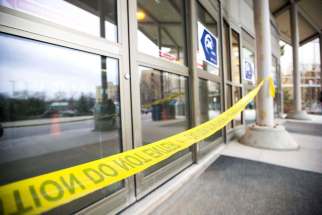New shelter spaces offer help for homeless
Read this article for free:
or
Already have an account? Log in here »
To continue reading, please subscribe:
Monthly Digital Subscription
$0 for the first 4 weeks*
- Enjoy unlimited reading on winnipegfreepress.com
- Read the E-Edition, our digital replica newspaper
- Access News Break, our award-winning app
- Play interactive puzzles
*No charge for 4 weeks then price increases to the regular rate of $19.00 plus GST every four weeks. Offer available to new and qualified returning subscribers only. Cancel any time.
Monthly Digital Subscription
$4.75/week*
- Enjoy unlimited reading on winnipegfreepress.com
- Read the E-Edition, our digital replica newspaper
- Access News Break, our award-winning app
- Play interactive puzzles
*Billed as $19 plus GST every four weeks. Cancel any time.
To continue reading, please subscribe:
Add Free Press access to your Brandon Sun subscription for only an additional
$1 for the first 4 weeks*
*Your next subscription payment will increase by $1.00 and you will be charged $16.99 plus GST for four weeks. After four weeks, your payment will increase to $23.99 plus GST every four weeks.
Read unlimited articles for free today:
or
Already have an account? Log in here »
Hey there, time traveller!
This article was published 01/04/2020 (2083 days ago), so information in it may no longer be current.
As the novel coronavirus pandemic shows early signs of spreading through community contact in Manitoba, local social service agencies are scrambling to prepare for the impact the virus will have on the homeless.
A new shelter will soon open in the downtown core, another in Osborne Village has extended operation for a month, and the provincial government is looking to establish isolation units in vacant buildings and hotels.
These measures are due to the risk the virus poses to the homeless, who often can’t socially isolate, have compromised immune systems, and lack consistent access to hygienic products.
One source working in the sector told the Free Press they’re worried the virus will “spread like wildfire” when it takes root in the city’s shelters. Another source said cases of COVID-19 are expected to turn up in the homeless population in the coming days.
The Main Street Project is setting up a new 190-bed shelter in a 72,000 square-foot building that was recently donated to them. The agency plans to move its entire shelter operation there, located at 190 Disraeli Freeway, and hopes a testing facility may be established.
“While we need more shelter space to do the proper social distancing and keep people safe, without this building we would have had to reduce space. And we haven’t even hit the infection rates we expect to see in Winnipeg,” said Rick Lees, executive director of the MSP.
“This was critical…It’s pretty remarkable. It just reminds me what Winnipeg is all about.”
The new digs are thanks to Dennis Levy, the property owner, who donated the building to MSP until the pandemic is over. Mark Chipman, the hockey executive, businessman and lawyer, connected the two parties.
The facility fills a desperate need for more beds at a time when space in shelters is shrinking due to social distancing protocols.
Levy said he planned to list the property for sale April 1 but decided to donate it instead, adding he “prays it makes a difference” and there will be time to sell when the pandemic is over.
“It always seems that in challenging times or in a changing landscape the disadvantaged become more disadvantaged… Too many fires to put out and not enough water, so to speak,” Levy said.
“My family just thought it would be the right thing to do and we are so grateful to be given the opportunity to help.”
The new space also allows MSP to utilize its current facility at 75 Martha St. for its men’s withdrawal management services. In roughly a month, the agency plans to open the Mitchell Fabrics building on Main Street as an emergency shelter for women.
Meanwhile, in cooperation with the Salvation Army, the MSP is running a new overnight shelter out of the former non-profit’s headquarters.
On top of scrambling to find space and beds during a global pandemic, the MSP has been tapped by the provincial government to help find a vacant building that can serve as isolation units as the infection rate continues to climb.
Alongside Manitoba Housing, Lees said they’re currently looking at a property with 39 studio apartments that could serve as a space for the homeless who have been tested or diagnosed.
“They would specifically be for low-barrier people who need to self-isolate for up to two weeks… It will be very specific to the shelter system and homeless people who have no ability to isolate,” Lees said.
On Tuesday, the provincial government issued a request for proposals seeking hotels and modular housing to serve as isolation units.
Gordon Taylor, executive director of the Salvation Army Centre of Hope, said a pressing need in the sector is isolation units.
Having shelters — while important — will be of little use if the spaces turn into incubators of the virus due to a lack of ability to isolate people who’ve been diagnosed, he said.
Despite the situation they’re in, Taylor said the mood around the Salvation Army — which has deployed an array of safety precautions — has been positive.
He said some people in the homeless community are handling the crisis well. Others aren’t even aware there’s a pandemic.
While he’s confident in the sector’s ability to weather this storm, Taylor said he expects it to pose a serious threat not just to the homeless, but also the frontline workers trying to help them.
“I’m assuming I’ll get it,” he said.
“I’m assuming a lot of us will.”
ryan.thorpe@freepress.mb.ca
Twitter: @rk_thorpe

Ryan Thorpe likes the pace of daily news, the feeling of a broadsheet in his hands and the stress of never-ending deadlines hanging over his head.
Our newsroom depends on a growing audience of readers to power our journalism. If you are not a paid reader, please consider becoming a subscriber.
Our newsroom depends on its audience of readers to power our journalism. Thank you for your support.






